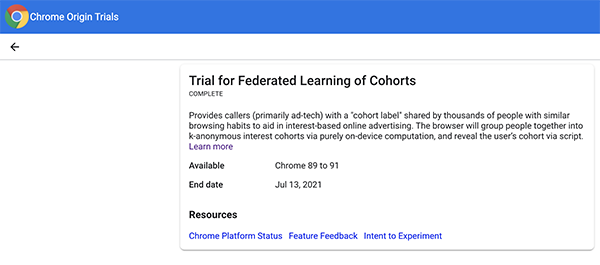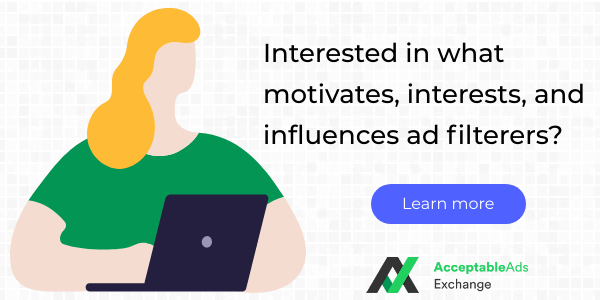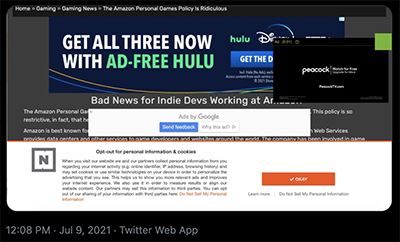| FLoC Testing Concludes, Results To Be Unknown |

Image sourced from Chrome Origin Trials
|
| The test run of Google’s FLoC (Federated Learning of Cohorts) is slated to conclude today. "We’ve decided not to extend this initial Origin Trial. Instead, we’re hard at work on improving FLoC to incorporate the feedback we’ve heard from the community before advancing to further ecosystem testing," wrote senior software engineer Josh Karlin in a Chromium Blink development forum. But don’t hold your breath, publishers or ad tech companies, because they have no plans of sharing any of that feedback with test participants, instead opting to remain tight-lipped and leaving companies to compare and contrast versions when updates are eventually released. Also leaving pubs and ad tech companies in the lurch is Google’s plan to push back the date of death for the third-party cookie, allowing them additional time to hone tools in their Privacy Sandbox. |
| The digital ad industry only generated an estimated $350 billion during the 2020 Pandemic, so sure let’s leave every company (that isn't a walled garden) whose livelihood rides on these decisions in a purgatory-esque situation. Everyone in the open web needs to prepare for a cookieless world and alternate ways to recoup profits that are sure to be lost to it. "The main summary of that feedback will be the next version, and you can surmise based on what features (and the reasoning for these changes) are available in the next version,” said Google mathematician Michael Kleber. If this is at all feeling a tad bit like deja vu, it should. Remember last year when we told you the Chrome team wasn't playing nice in W3C meetings and smaller companies were getting the shaft? Well, some lessons aren't so easily learned. Rather than keeping Privacy Sandbox changes under wraps, shouldn't Google discuss these industry-wide matters more openly so that companies won't be left scrounging at the last minute? |
| USA Today Launches Paywall, But Who’s The Target Audience? |
| USA Today is the last national newspaper sans paywall no longer; the company recently introduced a paywall that begins at $4.99 a month. The bigger question to consider is who is the paper’s target audience? The Washington Post, Wall Street Journal, and The New York Times can all be subscribed to for less, some with or without a discounted rate. What does USA Today, oft-considered a publication for travelers staying in hotels and subway riders offer that the big 3 cannot? The answer is local newspapers that fall under the Gannett umbrella, with many local stories running in USA Today. To date, Gannett is not offering a discount or special subscription rate between a local sub and premium content from USA Today. |
| Beefing up first-party data and authentication strategies is an ongoing battle for pubs. Testing various reg wall strategies in an effort to bring in alternative forms of revenue doesn’t hurt, either. As Dan Rua, CEO of Admiral recently told us, “beyond first-party data goals, digital subscription revenue is booming right now as a diversifying hedge against an uncertain future." And Chris Perrone from USA Today Sports shared, “Publishers suddenly have an advantage with authentication and first-party data because we are offering something to marketers that they can’t easily get elsewhere.” As much sense as that all makes, USA Today's particular regwall strategy has left some scratching their heads. "Without that local tie-in, and with a higher-than-expected price, I’m honestly not sure who the audience for a USA Today digital subscription is," writes Joshua Benton at NiemanLab. "That’s especially true if, as it seems, an awful lot of content will still be in front of the paywall." Just because a publisher can erect a paywall does it mean they should? |
 |
| How Has Working From Home Shaped Ad Blocking? | ||
| We’re hitting a point of generational shift. With Gen Z in its ascendancy, the older generations are settling into new, unfamiliar roles. The oldest Millennials are approaching middle age and generally hitting some of the major milestones of adult life. Moody, brooding Gen X is grappling with the challenges of mid-life as they think about retirement. And the Baby Boomers are experiencing the rewards of their golden years. We were curious about how these new changes in generational roles were impacting their views—especially, after a tumultuous year that saw life play out more online than ever before—towards ad blocking. So, with the help of the treasure trove of data over at the GlobalWebIndex (GWI), we researched ad blocking motivations across generations. We looked in particular at ad filterers—the 95% of ad blocking users that have an ad blocker installed on their device but consent to be served ads. When studying the five most pressing motivations for blocking ads, Gen Z’ers were more vocal than Millennials in their worries regarding ads. Gen Z was at the forefront of a number of issues, with higher percentages than Millennials responding that they were concerned that: “Ads sometimes contain bugs or viruses,” “There are too many ads on the internet,” “Ads are too intrusive,” and “To speed up loading times.” Gen X’ers, however, felt the need for speed. 45.7% answered the question “Why do you use an ad blocker?” with “To speed up loading times,” compared with 44.8% of Baby Boomers, 41.6% of Millennials and 42.6% of Gen Z’ers. And Baby Boomers are concerned that ads will get on their nerves. 70.8%— in more than any other demographic—answered the question “Why do you use an ad blocker?” with “Too many ads are annoying or irrelevant.” As generations grow up and age into new roles, their collective views on life tend to change in nuanced and fascinating ways. And, as our research proves, that includes their views on blocking ads. |
||
| Ad blocking users tend to have their collective fingers on the pulse. This 200 million-strong demographic is composed of highly educated, affluent digital natives, and their motivations often reflect larger cultural shifts ahead of time. That’s one reason why AAX is fascinated with ad blocking users, and why we penned our last study Why Block Ads? Behind User Reasons and Motivations. | ||
|
||
| The End of Big Tech? |
| President Biden signed an executive order last week aimed squarely at big tech and its monopoly on the industry. For starters, mergers between large companies will be closely examined, namely when smaller, potential competing firms are involved. And the data. So much data. Too much data. Biden will charge the FTC with implementing rules on how to limit the data hemorrhage from big tech companies. It's not like Facebook, Google, Apple, and Amazon haven't been down this road — with antitrust suits and data mining — but this goes beyond what big tech has seen before. |
| Competition is healthy; why make scooping up smaller competitors de rigeur? Consumers need a better understanding of what identifiable and non-identifiable information is collected from companies, where it goes and who sees it. This order tracks along with Sen. Ron Wyden of Oregon’s proposed legislation dubbed, “Protecting Americans’ Data from Foreign Surveillance Act of 2021.” Previous administrations allowed walled gardens to continue growing by cutting out the small fry and controlling the flow of data and advertising deals. Biden, on the other hand, is serious about cracking down and even looking to challenge past mergers (Hint: What if Google Never Acquired Doubleclick). |
| Around the Water Cooler |
| Here's what else we've been reading and thinking about... Open Web For the Picking Every industry wants in on the ad network business. With advertising making a major comeback, Axios reports that delivery services like Instacart, all the retail giants, grocers, pharmacies, and even gaming are all getting into the advertising game. TTD Vs Walled Gardens TTD launched an investment arm, TD7, to invest in ad tech innovators focused on the open web, with the first investment in Chalice, an ad tech startup specializing in ad algorithms for buyers. It also launched ad-buying platform Solimar, to limit the number of ads consumers see on free streaming services. Solimar should also boost adoption of cookie-replacement UID 2.0. |
 |
||||||
|
||||||
 |
||||||
|
||||||
 |
||||||
|
| @{optoutfooterhtml}@ |










